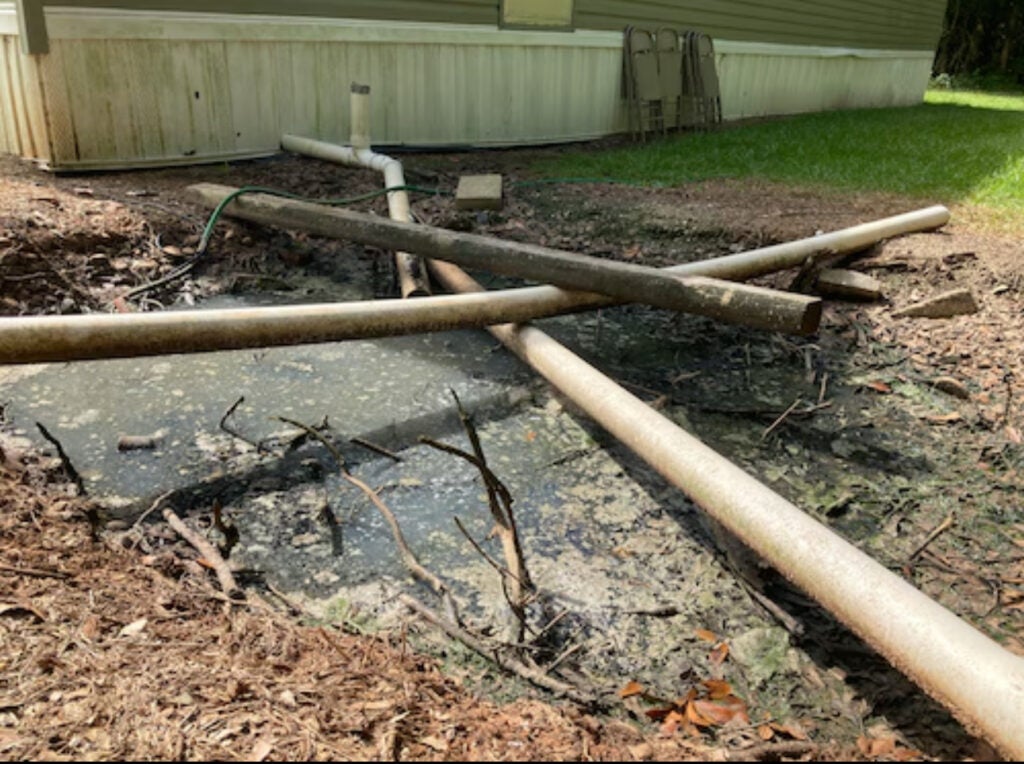Wastewater issues continue plaguing Lowndes County
Published 5:53 pm Wednesday, April 10, 2024

- A straight pipe sewage draining system expels waste outside a Lowndes County home. Photo by Dennis Pillion.
|
Getting your Trinity Audio player ready...
|
The wastewater disposal crisis in Lowndes County is one that continues to affect residents throughout the community. The issues have been going on for decades and have caused long term sanitation problems for the county’s residents.
For more than 30 years Lowndes residents have grappled with sewage disposal challenges stemming from improper septic tank installations, and two important meetings were held last week to host community discussion on dealing with the problem.
The first meeting was held at Snow Hill Christian Church, with representatives of the U.S. Department of Justice (DOJ), the Alabama Department of Public Health (ADPH) and local pastors gathering to organize a grassroots plan for helping residents complete the ADPH’s new assessment.
The second meeting was held at the Town Hall between community leaders, the DOJ, and ADPH officials where it was decided that the ADPH would be working with the Lowndes County Unincorporated Wastewater Project (LCUWP) as another way to get the assessments done.
Carmelita Arnold, LCUWP Board President, said that although the organization tries to combat the wastewater issues, there is still a lack of funding to correct the problem.
“We cannot repair or install without money,” Arnold said. “Right now we are focused on finding funding so that we can work on these issues. It’s vital that we do so soon because the problem has existed for so long and a lot of the money that has come into the county for that purpose was never used for that purpose. Our intention is to see to it that the goal of every resident in Lowndes County having legal and proper septic systems to prevent health issues. We also plan to offer housing rehabilitation and trailer replacement but we don’t have anything in the works for that right now.”
A separate organization, the Black Belt Wastewater Program (BBUWP) is also working to address the issue.
Sherry Bradley, BBUWP executive director, emphasized the importance of the organization and said that beside wastewater issues, the project tries its best to combat other problems in the community as well.
“For more than 20 years I have heard issues about sewage on the ground and nobody had done anything about it,” Bradley said. “The BBUWP is doing something about these issues. “There is a solution now and we work to fix these wastewater issues. Not only do we fix the outside of homes, we fix the inside as well. If you have a leaky faucet, it’s going to cause even more issues with your septic tank. We go in and change out faucets, toilets, and bathtubs. If we see that there’s a problem, we fix it and that helps the septic tanks run better. Nobody does that but us.”
Many residents in the area lack access to centralized municipal sewage disposal or proper septic systems due to the high cost of installing and maintaining the systems. These residents resort to a straight pipe disposal method that discharges raw sewage outdoors, a situation which threatens people’s health and weakens the local environment.
Bradley said that the cost of the high-end sewage systems needed for waste disposal in Lowndes County soil is a huge hindrance to getting many of the wastewater issues resolved.
“To tell you the truth, many of the people in the county can not afford these systems,” Bradley said. “They run anywhere from $17,000 to $28,000 and if we have to go in to remove trees or fix things then it’s even more. If you look at the poverty level for Lowndes County, the majority of the people in the unincorporated area can’t afford it so they do need help and we’re there to help them.”
Community meetings are still going on across the county and completing the ADPH assessment is the first step in getting assistance to address the problem. The agency is asking residents to complete an assessment that is available online and can be mailed out to residents for completion.
For more information, visit www.alabamapubllichealth.gov/environmental/septic-system-program.html.
To contact the LCUWP, call (334) 548-2006.
To talk with a representative of BBUWP, call (334) 300-6619.





